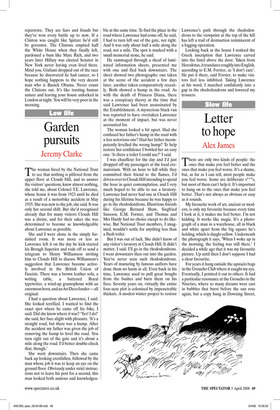Garden pursuits
Jeremy Clarke
The woman hired by the National Trust to see that nothing is pilfered from the upper floor at Clouds Hill, and to answer the visitors’ questions, knew almost nothing, she told me, about Colonel T.E. Lawrence, whose house it was from 1923 until he died as a result of a motorbike accident in May 1935. She was new to the job, she said. It was only her second shift. But she’d recognised already that for many visitors Clouds Hill was a shrine, and for their sakes she was determined to become as knowledgeable about Lawrence as possible.
She and I were alone in the simply furnished room. It was more or less as Lawrence left it on the day he kick-started his Brough Superior and rode off to send a telegram to Henry Williamson inviting him to Clouds Hill to discuss Williamson’s suggestion that Lawrence become actively involved in the British Union of Fascists. There was a brown leather sofa, a writing table, a battered Royal typewriter, a wind-up gramophone with an enormous horn, and an Art Deco fender — all original.
I had a question about Lawrence, I said. She looked terrified. I wanted to find the exact spot where he came off his bike, I said. Did she know where it was? ‘Yes! I do!’ she said, her face alight with pleasure. ‘It’s a straight road, but there was a hump. After the accident my father was given the job of removing the hump to level the road. You turn right out of the gate and it’s about a mile along the road. I’d better double-check that, though.’ She went downstairs. Then she came back up looking crestfallen, followed by the man whose job it was to keep an eye on the ground floor. Obviously under strict instructions not to leave his post for a second, this man looked both anxious and knowledgea ble at the same time. To find the place in the road where Lawrence had come off, he said, I had to turn left out of the gate, not right. And it was only about half a mile along the road, not a mile. The spot is marked with a small memorial stone, he said.
He rummaged through a sheaf of laminated information sheets, presented me with one and fled back downstairs. The sheet showed two photographs: one taken at the scene of the accident a few days later, another taken comparatively recently. Both showed a hump in the road. As with the death of Princess Diana, there was a conspiracy theory at the time that said Lawrence had been assassinated by the Establishment. A mysterious black van was reported to have overtaken Lawrence at the moment of impact, but was never accounted for.
The woman looked a bit upset. Had she confused her father’s hump in the road with a less notorious one? Had her father incompetently levelled the wrong hump? To help restore her confidence I bowled her an easy one. ‘Is there a toilet I could use?’ I said.
I was chauffeur for the day and I’d just dropped off my passengers at the local crematorium. With an hour to kill while they committed their friend to the flames, I’d driven over to Clouds Hill intending to spend the hour in quiet contemplation, and I very much hoped to be able to use a lavatory. Lawrence had never had one at Clouds Hill during his lifetime because he was happy to go in the rhododendrons. Illustrious friends like George Bernard Shaw, Siegfried Sassoon, E.M. Forster, and Thomas and Mrs Hardy had no choice except to do likewise. But National Trust members, I imagined, wouldn’t settle for anything less than a flush toilet.
But I was out of luck. She didn’t know of any visitor’s lavatory at Clouds Hill. It didn’t matter, I said. I’ll go in the rhododendrons. I went downstairs then out into the garden. You’ve never seen such rhododendrons. Years of manuring by famous authors have done them no harm at all. Even back in his time, Lawrence used to pull great boughs from the bushes and burn them on his fires. Seventy years on, virtually the entire four-acre plot is colonised by impenetrable thickets. A modest winter project to restore Lawrence’s path through the rhododendrons to the viewpoint at the top of the hill has left a trail of destruction reminiscent of a logging operation.
Looking back at the house I noticed the Greek inscription that Lawrence carved into the lintel above the door. Taken from Herodotus, it translates roughly into English, according to E.M. Forster, as ‘I don’t care’. He put it there, said Forster, to make visitors feel less inhibited. Taking Lawrence at his word, I marched confidently into a gap in the rhododendrons and lowered my trousers.


































































 Previous page
Previous page